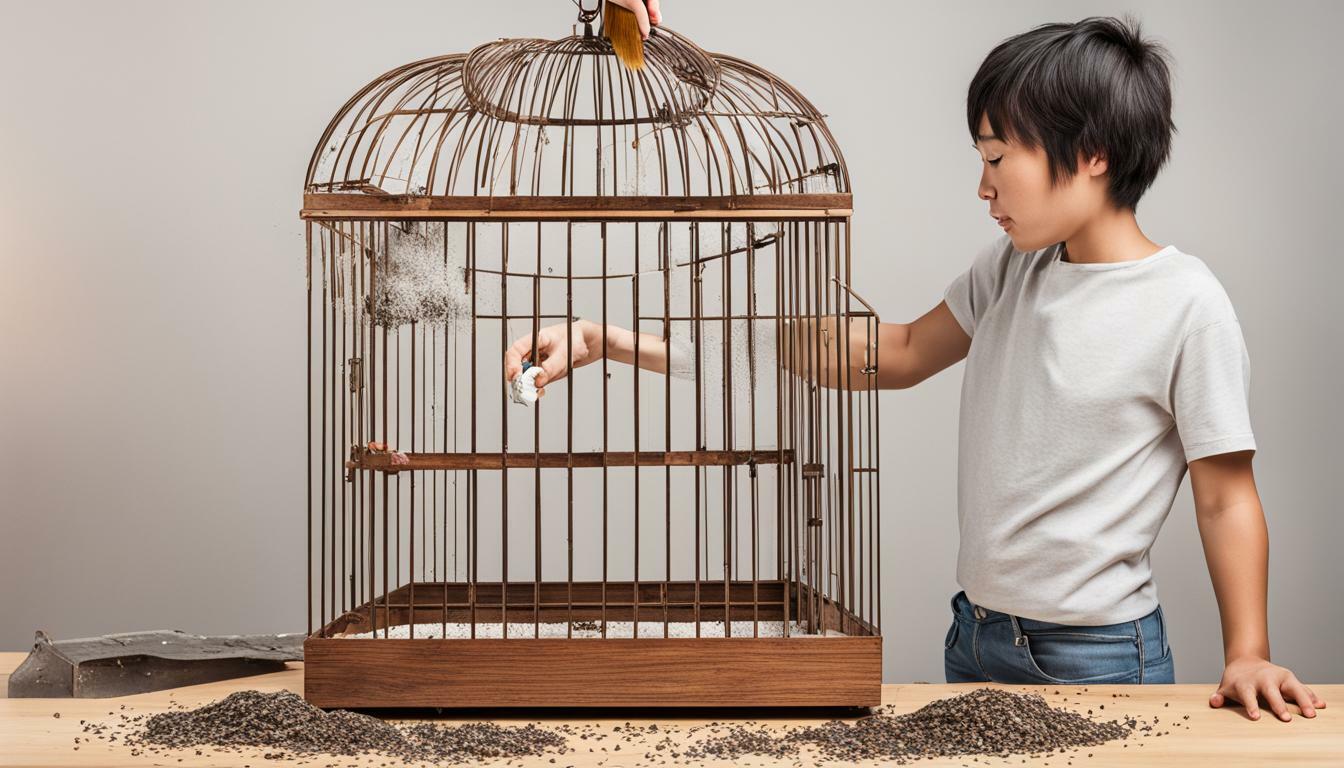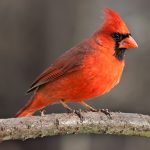As a pet bird owner, you may have noticed that your feathered friend has a tendency to leave droppings everywhere. It can be frustrating and messy, but it’s a natural behavior for birds. However, with some proactive measures, you can reduce the mess and keep your home clean. In this article, we’ll explore the best ways to manage bird droppings and maintain a hygienic living space for you and your pet.
Key Takeaways:
- Pet birds tend to poop everywhere due to their natural instincts.
- Maintaining a clean birdcage is essential in reducing bird poop mess.
- Training your pet bird to poop in designated areas is possible with positive reinforcement.
- Cleaning up bird droppings requires proper techniques and cleaning products.
- Maintaining bird cage hygiene is crucial for preventing the spread of diseases.
- Handling pet bird feces safely is important for minimizing health hazards.
Understanding Bird Poop Behavior
As a pet bird owner, you may be familiar with the mess caused by bird droppings. While it may seem like your feathered friend poops everywhere and often, understanding their behavior can help you reduce the mess.
Birds have a natural instinct to maintain their surroundings clean. In the wild, they poop in specific locations to avoid attracting predators. However, when kept in a cage or indoors, they may not have the same opportunity to follow this behavior.
Another factor that influences your bird’s poop habits is their diet. Birds that eat a lot tend to poop more often. Additionally, the consistency and color of their poop can indicate their health status. Regularly monitoring your bird’s droppings can help you detect any changes early on.
Proper bird cage hygiene is essential in reducing the mess caused by bird droppings. Cleaning the cage regularly, providing fresh food and water, and using litter trays can all help prevent the spread of bacteria and disease, as well as reduce the amount of poop outside the designated pooping areas.
By understanding your pet bird’s poop behavior and taking proactive measures to maintain their living environment, you can reduce the mess caused by bird droppings and ensure a clean and healthy home for both you and your feathered companion.
How to Prevent Bird Poop Mess in Your Home
As a pet bird owner, dealing with bird droppings is a common challenge. However, with the right strategies, you can minimize the mess caused by bird poop and keep your home clean. Here are some practical tips to help you prevent bird poop mess:
Create a Designated Poop Area
One way to minimize the mess caused by bird droppings is to train your pet bird to use a designated area for bathroom purposes. You can use a litter tray or a specific spot in your birdcage. Be consistent with the location so that your pet bird can easily recognize it. Use positive reinforcement techniques to encourage your bird to use the designated area and reward them with treats when they do so.
Keep Your Birdcage Clean
Regular cleaning of your birdcage is crucial in reducing the mess caused by bird droppings. Clean the cage at least once a week or more frequently if needed. Remove any soiled bedding, food, and water bowls, and disinfect the cage with bird-safe cleaning products. A clean cage encourages your bird to use the designated poop area and promotes better hygiene for both your pet bird and your home.
Use Birdcage Liners
Birdcage liners can help prevent bird poop mess. Choose a liner made of bird-safe material such as unbleached paper or cloth. Replace the liner regularly to maintain hygiene and prevent bad odor and stains. You can also use liners for any outside-of-cage play areas to minimize cleanup time and effort.
Place Your Birdcage in an Appropriate Location
Choose a location for your birdcage that is easy to clean and not too close to high-traffic areas of your home. This can help minimize the mess caused by bird droppings outside of the cage. Avoid placing your birdcage near any furniture, carpets, or curtains that may be difficult to clean or stain.
Use Bird-Proofing Products
Several bird-proofing products are available in the market that can help minimize the mess caused by bird droppings. For example, bird diaper harnesses, bird poop skirts, and bird poop splash guards can be useful in preventing bird poop mess outside of the cage. However, it is important to ensure that these products are made of bird-safe materials and fit properly to avoid causing discomfort or injury to your pet bird.
By following these tips, you can reduce the mess caused by pet bird droppings and maintain a clean and hygienic living environment for you and your feathered friend.
Training Your Pet Bird to Poop in Designated Areas
If you’re tired of cleaning up after your pet bird’s droppings, training them to use designated poop areas can significantly reduce the mess in your home. This training process requires patience, consistency, and positive reinforcement techniques. Here’s how you can train your pet bird to poop in specific areas:
- Create a designated area for your bird to poop, such as a litter tray or a piece of newspaper.
- Observe your bird closely and take note of their natural bathroom habits. Birds typically poop after they eat, drink, or wake up from a nap.
- When you notice your bird is about to poop, gently move them to the designated area and use a designated phrase, such as “Go potty” or “Do your business”.
- When your bird successfully poops in the designated area, give them verbal praise, a treat, or a favorite toy to reinforce positive behavior.
- Continue this process consistently until your bird learns to associate the designated area with bathroom time.
Remember, training your pet bird to use designated poop areas requires patience and consistency. It may take several weeks or even months for your bird to learn this behavior. Be sure to clean the designated area regularly and provide plenty of positive reinforcement to encourage your bird’s good bathroom habits.
Reducing bird poop mess in your home requires not only training but also consistent maintenance of bird cage hygiene and safe handling practices. In the following sections, we’ll discuss more tips and strategies for managing bird droppings in the house.
Tips for Cleaning Up Bird Droppings
If you are a pet bird owner, you know that cleaning up after your feathered friend can be a messy task. Here are some bird poop cleaning tips to help you manage bird droppings in your house:
- Act fast: As soon as you notice a bird dropping, clean it up immediately to prevent stains and odors.
- Use appropriate cleaning products: Avoid using harsh chemicals that can be harmful to your bird. Use mild detergents and disinfectants to clean bird cages and surrounding areas.
- Protect yourself: Wear gloves and a mask while cleaning bird droppings to avoid any health hazards.
- Invest in a good bird poop cleanup hack: Consider purchasing a bird poop cleanup kit that includes cleaning agents, odor eliminators, and other necessary tools to quickly clean up any messes.
Remember, bird droppings can carry bacteria and viruses, so it’s important to handle them with care. Proper and prompt cleaning can help prevent the spread of germs and keep your home clean and healthy.
Maintaining Bird Cage Hygiene
Keeping your pet bird’s cage clean is essential for their health and wellbeing, as well as for reducing the mess caused by bird droppings. A clean birdcage can also help minimize the spread of diseases and infections. Here are some tips to maintain bird cage hygiene:
- Clean the cage daily. Remove any uneaten food, feathers, and bird droppings.
- Use an appropriate disinfectant to sanitize the cage once a week.
- Replace the cage lining and other materials regularly.
- Provide fresh food and water daily.
- Avoid using harsh chemicals or cleaners that can harm your bird.
Consistency is key to maintaining a clean and healthy birdcage. By following a regular cleaning routine, you can help reduce the mess caused by bird droppings and keep your home clean with pet birds.
Tips for Handling Pet Bird Feces Safely
If you own a pet bird, you are likely familiar with the mess caused by their droppings. While cleaning up after your feathered friend is essential for maintaining a healthy living environment, it’s important to handle bird feces safely to avoid potential health risks. Follow these tips for managing bird droppings in your house:
- Use gloves: Always wear protective gloves when handling bird droppings or soiled materials.
- Dispose properly: Place bird droppings in a plastic bag and seal it before disposal. Avoid flushing bird droppings down the toilet or throwing them in the trash.
- Wash your hands: Thoroughly wash your hands with soap and warm water after cleaning up bird droppings or handling soiled materials.
- Disinfect: Use a bird-safe disinfectant to clean the affected area to prevent the spread of bacteria or viruses.
- Visit the vet: Regularly take your pet bird for check-ups with a veterinarian to ensure they are healthy and detect any potential health issues early.
By following these tips, you can safely manage bird droppings in your home and reduce the risk of infections or illnesses caused by bird feces.
Conclusion
Congratulations! You have made it to the end of the article, and now you are armed with all the knowledge you need to manage your pet bird’s droppings. Remember, birds are messy creatures by nature, but with a little effort and patience, you can keep your home clean and your bird healthy.
Regular cleaning of your bird’s cage, creating designated poop areas, and training your bird to poop in specific locations are just a few of the effective strategies you can use to reduce the mess caused by bird droppings. Additionally, maintaining bird cage hygiene, handling pet bird feces safely, and providing your bird with fresh food and water are essential for ensuring your bird remains healthy and happy.
We hope that the information provided in this article will help you and your pet bird live in harmony and provide you with a greater understanding of how to prevent bird poop mess in your home. By taking these proactive measures, you can enjoy all the joys and benefits of having a pet bird without worrying about the mess.
Do Birds Only Show Affection to Their Owners Through Petting?
Birds show affection in various ways, not just through petting. While some birds enjoy physical contact, such as being petted or groomed, avian affection extends beyond this. They may vocalize, sing, preen their owners, or even engage in playful behavior. Understanding these diverse expressions of love helps build a deeper connection between birds and their owners. Avian affection: birds and petting should be seen as part of a larger spectrum of bird-human bonding.
Can Birds’ Diet Affect Their Pooping Habits?
Birds’ dietary habits can indeed affect their pooping habits. The type of food they consume plays a significant role in the consistency, color, and frequency of their droppings. For example, a diet rich in seeds may result in firmer and darker droppings, while a diet high in fruits can lead to looser and lighter droppings. Additionally, dietary changes can impact the frequency of their bowel movements, with certain foods causing more frequent or irregular pooping patterns.
FAQ
Q: Do pet birds poop everywhere?
A: Yes, pet birds have a natural instinct to poop frequently and in different places. However, there are strategies to minimize the mess and keep your home clean.
Q: How can I reduce bird poop mess?
A: Regularly cleaning your birdcage, providing designated poop areas, and training your bird to poop in specific locations can help reduce the mess caused by bird droppings.
Q: What are some bird poop cleaning tips?
A: When cleaning up bird droppings, it’s important to use appropriate cleaning products, follow proper cleaning techniques, and take necessary safety precautions to ensure effective cleanup.
Q: How do I train my pet bird to poop in designated areas?
A: Training your pet bird to poop in designated areas involves positive reinforcement techniques, consistency, and patience. By using rewards and consistent training, you can teach your bird where it’s appropriate to relieve itself.
Q: How do I maintain bird cage hygiene?
A: Regularly cleaning your birdcage, disinfecting it properly, and providing fresh food and water are essential for maintaining bird cage hygiene. This helps prevent the spread of diseases and reduces the mess caused by bird droppings.
Q: How should I handle pet bird feces safely?
A: It’s important to handle pet bird feces safely to minimize the risk of contamination. Proper disposal methods, personal hygiene practices, and regular veterinary check-ups are essential for ensuring the health and well-being of both you and your bird.










